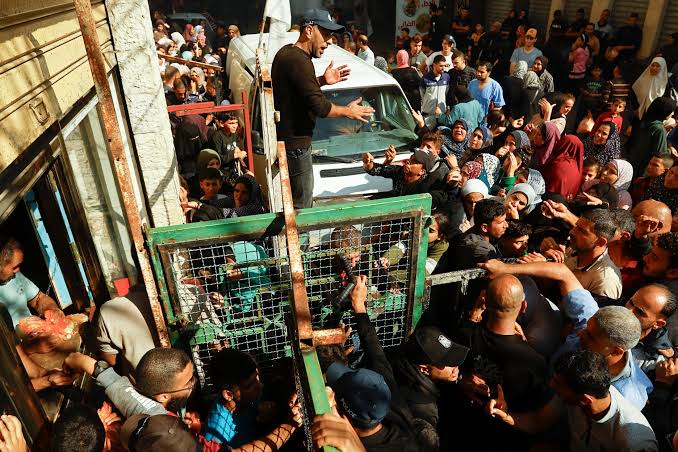GAZA/OCCUPIED JERUSALEM (Reuters) : Israel issued a fresh warning to Palestinians in the southern city of Khan Younis to move out of the line of fire and closer to humanitarian aid, in the latest indication that it plans to attack Hamas in south Gaza after subduing the north.
“We’re asking people to relocate. I know it’s not easy for many of them, but we don’t want to see civilians caught up in the crossfire,” Mark Regev, an aide to Israeli Prime Minister Benjamin Netanyahu, told MSNBC on Friday.
Such a move could compel hundreds of thousands of Palestinians who fled south from the Israeli assault on Gaza City to relocate again, along with residents of Khan Younis, a city of more than 400,000, worsening a dire humanitarian crisis.
Israel vowed to annihilate the Hamas group that controls the Gaza Strip after its Oct. 7 rampage into Israel in which its fighters killed 1,200 people and dragged 240 hostages into the enclave.
Since then, Israel has bombed much of Gaza City to rubble, ordered the depopulation of the entire northern half of the narrow strip and left homeless around two-thirds of the enclave’s 2.3 million Palestinians.
Many of those who have fled fear their displacement could become permanent.
Gaza health authorities raised their death toll on Friday to more than 12,000, 5,000 of them children.
The United Nations deems those figures credible, though they are now updated infrequently due to the difficulty of collecting information.
Israel dropped leaflets over Khan Younis telling people to evacuate to shelters, suggesting military operations there were imminent. About 26 Palestinians, mostly children, were killed in an Israeli bombardment of the city early on Saturday, the Palestinian news agency WAFA said.
Regev said Israeli troops will have to advance into the city to oust Hamas fighters from underground tunnels and bunkers but that no such “enormous infrastructure” exists in less built-up areas to the west.
“I’m pretty sure that they won’t have to move again” if they move west, he said, referring to people in the area. “We’re asking them to move to an area where hopefully there will be tents and a field hospital.”
Because the western areas are closer to the Rafah border crossing with Egypt, humanitarian aid could be brought in “as quickly as possible,” Regev said.
Fuel deliveries
With the war entering its seventh week, there was no sign of any let-up, despite international calls for a ceasefire or at least for humanitarian pauses. “We have prepared ourselves for a long and sustained defence from all directions.
The more time the occupation’s forces stay in Gaza, the heavier their continuous losses,“ Hamas armed wing spokesman Abu Ubaida said in a video statement. Violence flared in the occupied West Bank, with at least five Palestinians killed and two injured in an Israeli strike on a building in the Balata refugee camp in the central city of Nablus, the Palestinian Red Crescent ambulance service said early on Saturday. There was no immediate comment from the Israeli military.
Amid warnings that its Gaza siege would cause starvation and disease, Israel on Friday appeared to bow to international pressure, agreeing to allow fuel trucks in and promising “no limitation” on aid requested by the United Nations.
Israel said it would allow two truckloads of fuel a day at the request of Washington to help the UN meet basic needs, and spoke of plans to increase aid more broadly.
“We will increase the capacity of the humanitarian convoys and trucks as long as there is a need,” Colonel Elad Goren from COGAT, the ministry of defence agency that coordinates administrative issues with the Palestinians, told a briefing.
The remarks appeared to signal a shift in tone after UN agencies warned that humanitarian conditions in Gaza were rapidly deteriorating, including a stark warning from the World Food Programme of the “immediate possibility of starvation”.
The White House said in a post on X, formerly known as Twitter, that the fuel deliveries should “continue on a regular basis and in larger quantities.”
At Gaza’s biggest hospital, Al Shifa, Israel said its forces had found a vehicle with a large number of weapons and what it called a Hamas tunnel shaft.
The facility has been a primary target of Israel’s ground assault and a focus of international alarm over the deepening humanitarian crisis.
The army released a video it said showed a tunnel entrance in an outdoor area of the hospital.
It appeared the area had been excavated. A bulldozer appeared in the background.
Baby, hostage die
Israel has long maintained that the hospital sits above a vast underground bunker housing a Hamas command headquarters. Hospital staff say this is false and that Israel’s findings there have so far established no such thing.
Hamas denies using hospitals for military purposes.
Al Shifa staff said a premature baby died at the hospital on Friday, the first baby to die there in the two days since Israeli forces entered.
Three had died in the previous days while the hospital was surrounded.
Hamas also announced the death of a captive from Israel, an 85-year-old it said died of a panic attack during an air strike.
In Modiin, Israel, family held a funeral for Noa Marciano, 19, an Israeli army conscript whose body was recovered from Gaza City near the hospital on Thursday.
She had been abducted from a military base during the Oct. 7 Hamas attack.







